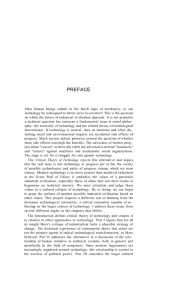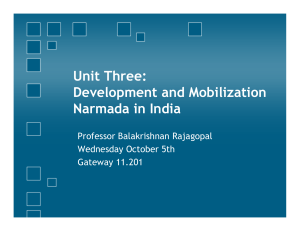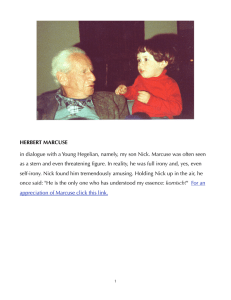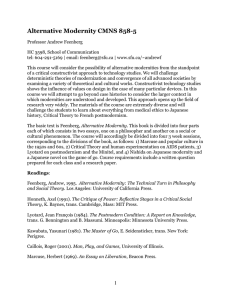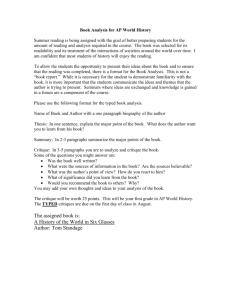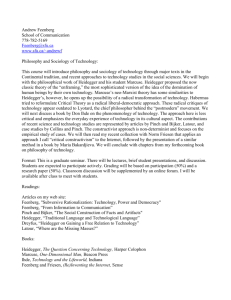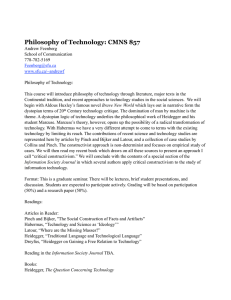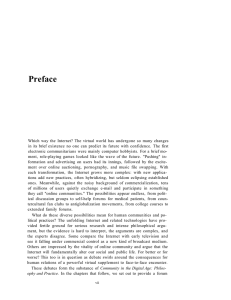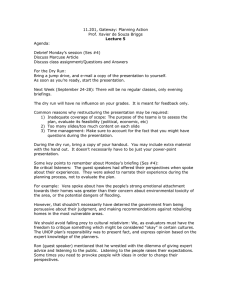Preface
advertisement
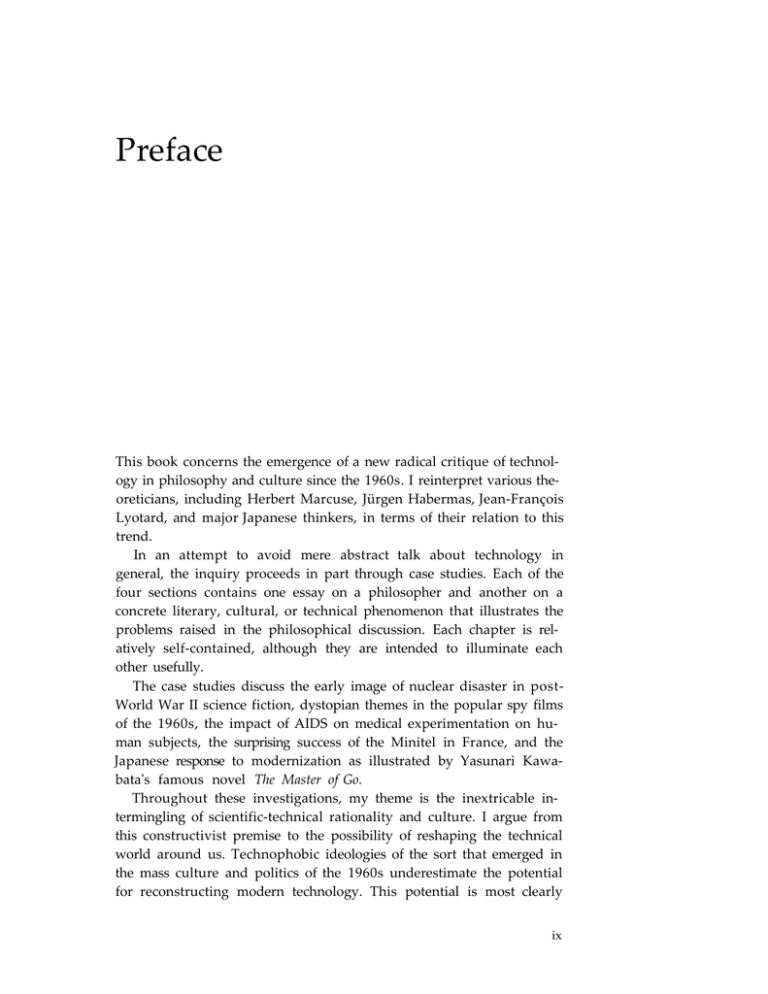
Preface This book concerns the emergence of a new radical critique of technology in philosophy and culture since the 1960s. I reinterpret various theoreticians, including Herbert Marcuse, Jürgen Habermas, Jean-François Lyotard, and major Japanese thinkers, in terms of their relation to this trend. In an attempt to avoid mere abstract talk about technology in general, the inquiry proceeds in part through case studies. Each of the four sections contains one essay on a philosopher and another on a concrete literary, cultural, or technical phenomenon that illustrates the problems raised in the philosophical discussion. Each chapter is relatively self-contained, although they are intended to illuminate each other usefully. The case studies discuss the early image of nuclear disaster in postWorld War II science fiction, dystopian themes in the popular spy films of the 1960s, the impact of AIDS on medical experimentation on human subjects, the surprising success of the Minitel in France, and the Japanese response to modernization as illustrated by Yasunari Kawabata's famous novel The Master of Go. Throughout these investigations, my theme is the inextricable intermingling of scientific-technical rationality and culture. I argue from this constructivist premise to the possibility of reshaping the technical world around us. Technophobic ideologies of the sort that emerged in the mass culture and politics of the 1960s underestimate the potential for reconstructing modern technology. This potential is most clearly ix x Preface exemplified by the history of the computer. Social institutions that appear to rest on solid technical foundations, such as medicine, turn out to incorporate values in their very structure, and to be not so very solid after all. Modernization itself, I argue, is a contingent combination of technical and cultural dimensions subject to radical variation. Aesthetics, ethics, and culture can play a role alongside science and technology in the emergence of alternative modernities. Although Alternative Modernity is strongly influenced by the Frankfurt School, in chapters 2 and 4 I explain why I think the Critical Theory tradition must now be revised. I attempt to overcome the frozen opposition, to which the Frankfurt School contributed, between those who are "for" and those who are "against" technology. At the same time, I am not willing to abandon the whole critical tradition of technology studies in postmodern resignation or celebration. The essay on Lyotard explains my reservations about this trend. The concluding chapters on Japan attempt to come to terms with the new multiculturalism in a way that avoids both positivist universalism and ethnic relativism. Here I draw provisional conclusions regarding the reconciliation of the often conflicting claims of reason and culture. Both the philosophical and the political tradition need to be studied anew in the light of the growing importance of technology in modern societies. These essays make a start on this neglected task. However, my focus on technology is meant to bring it back into the critical discussion, not to eclipse the many other, equally important dimensions of modern societies that have begun to receive attention in recent years. In the hope of adding another thread to the discussion, I offer models here of a new kind of social criticism, mixing cultural hermeneutics, sociology of technology, and ethical inquiry, that is, I believe, urgently needed today. Most of the essays collected here are based on earlier publications, heavily reworked for this book. With the exception of chapter 3, which belongs too fully to its time to be brought entirely up to date, they have all been updated wherever possible. The original versions appeared in whole or in part in the following sources: "Technocracy and Rebellion: Spy Films and Social Criticism," Telos, Summer 1970; "An End to History: Science Fiction in the Nuclear Age," Johns Hopkins Magazine, March 1977; "The Bias of Technology," in R. Pippin, A. Feenberg, and C. Webel, eds., Marcuse: Critical Theory and the Promise of Utopia (South Hadley, Mass.: Bergin and Garvey Press, Preface xi 1987); "A User's Guide to the Pragmatics of Computer Mediated Communication," Semiotica, July 1989; "From Information to Communication: The French Experience with Videotex," in M. Lea, ed., Contexts of Computer Mediated Communication (London: HarvesterWheatsheaf, 1992); "On Being a Human Subject: Interest and Obligation in the Experimental Treatment of Incurable Disease," Philosophical Forum, Spring 1992; "The Critique of Technology: From Dystopia to Interaction," in J. Bokina and T. Lukes, eds., Marcuse Revisited (Lawrence: University of Kansas Press, 1993); "The Technocracy Thesis Revisited: On The Critique of Power," Inquiry, Spring 1994; "Playing the Japanese Game of Culture: Kawabata's Master of Go," Cultural Critique, Fall 1994. I would like to thank the following friends and colleagues for sharing their ideas and helping me to formulate mine: Yoko Arisaka, Hal Barwood, Catherine Bertho, Jean-Marie Charon, Peter Dale, Gerald Doppelt, Anne-Marie Feenberg, Peter Fitting, Marc Guillaume, Linda Harasim, Ruth Heifetz, Sharon Helsel, Martin Jay, Nobuo Kazashi, Douglas Kellner, Illana Löwy, Marie Marchand, Ted Melnechuk, Ryosuke Ohashi, Robert Pippin, Mark Poster, Richard Smith, and Morton Söby. Alternative Modernity The Technical Turn in Philosophy and Social Theory Andrew Feenberg UNIVERSITY OF CALIFORNIA PRESS Berkeley • Los Angeles • London
